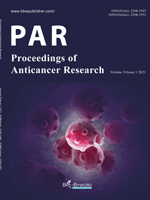Abstract
Pancreatic cancer is a common tumor of the digestive system. At present, the pathogenesis is still unclear, but current research on inducible nitric oxide synthase in relation to the pathogenesis of pancreatic malignant tumors is particularly extensive. Therefore, this article focuses on the research progress on inducible nitric oxide synthase in the pathogenesis of pancreatic cancer.
References
Rahib L, Smith BD, Aizenberg R, 2014, Projecting Cancer Incidence and Deaths to 2030: The Unexpected Burden of Thyroid, Liver, and Pancreas Cancers in the United States. Cancer Res, 74: 2913–2921.
Gukovsky I, Li N, Todoric J, 2013, Inflammation, Autophagy, and Obesity: Common Features in the Pathogenesis of Pancreatitis and Pancreatic Cancer. Gastroenterology. 144(6):1199–1209.e4.
Tamir S, Gal A, Tannenbaum SR, 1995, Nitric Oxide Production in Relation to Spontaneous B-Cell Lymphoma and Myositis in SJL Mice. Cancer Res, 55: 4391–4397.
Tamir S, Tannenbaum SR, 1996, The Role of Nitric Oxide (NO) in the Carcinogenic Process. Biochim Biophys Acta. 1288: F31–36.
Jenkins DC, Charles IG. 1995, Roles of Nitric Oxide in Tumor Growth. Proc Natl Acad Sci U S A, 92: 4392–4396.
Hussain SP, Hofseth LJ, Harris CC, 2003, Radical Causes of Cancer. Nat Rev Cancer. 3: 276–285.
Lim KH, Ancrile BB. 2008, Tumour Maintenance is Mediated by eNOS. Nature. 452: 646–649.
Lampson BL, Kendall SD, Ancrile BB, et al., 2012, Targeting eNOS in Pancreatic Cancer. Cancer Res, 72(17): 4472-4482.
Vickers SM, Green M, 1999, Association of Increased Immunostaining for Inducible Nitric Oxide Synthase and Nitrotyrosine with Fibroblast Growth Factor Transformation in Pancreatic Cancer. Arch Surg, 134: 245–251.
Chung HT, 2001, Nitric Oxide as a Bioregulator of Apoptosis. Biochem Biophys Res Commun, 282: 1075–1079.
Li A, Morton JP, Ma Y, et al. 2014, Fascin is Regulated by Slug, Promotes Progression of Pancreatic Cancer in Mice, and is Associated with Patient Outcomes. Gastroenterology. 146: 1386–1396.
Hou YC, Chao YJ, Tung HL, et al., 2014, Coexpression of CD44-positive/CD133-positive Cancer Stem Cells and CD204-positive Tumor-Associated Macrophages is a Predictor of Survival in Pancreatic Ductal Adenocarcinoma. Cancer, 120: 2766–2777.
Weizman N, Krelin Y, 2014, Macrophages Mediate Gemcitabine Resistance of Pancreatic Adenocarcinoma by Upregulating Cytidine Deaminase. Oncogene, 33: 3812–3819.
Sanford DE, Belt BA, et al., 2013, Inflammatory Monocyte Mobilization Decreases Patient Survival in Pancreatic Cancer: A Role for Targeting the CCL2/CCR2 Axis. Clin Cancer Res, 19: 3404–3415.
Schetter AJ, Heegaard NH, Harris CC, 2010, Inflammation and Cancer: Interweaving MicroRNA, Free Radical, Cytokine and p53 Pathways. Carcinogenesis. 31: 37–49.
Okayama H, Saito M, 2013, NOS2 Enhances KRAS-Induced Lung Carcinogenesis, Inflammation and MicroRNA-21 Expression. Int J Cancer, 132: 9–18.
Dillhoff M, Liu J, 2008, MicroRNA-21 is Overexpressed in Pancreatic Cancer and a Potential Predictor of Survival. J Gastrointest Surg, 12: 2171–2176.
Liu J, Li K, Dou K, 2003, The Expression of iNOS and COX-2 in Pancreatic Cancer and its Clinical Significance. Cancer Research on Prevention and Treatment, 30(5): 361-361.
